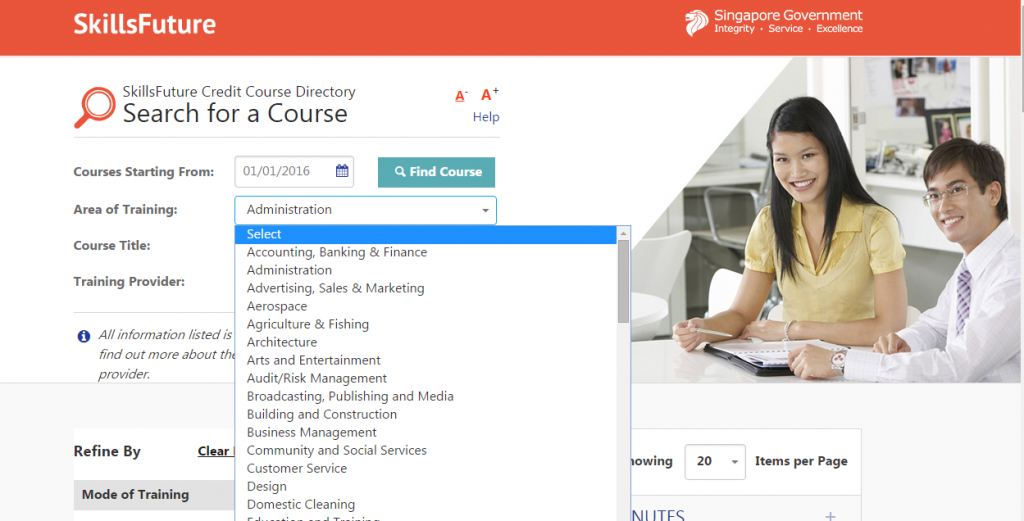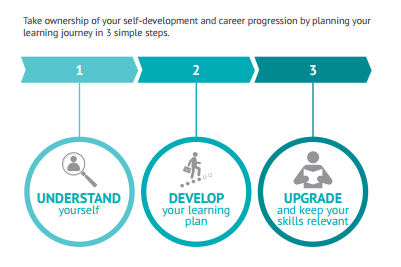What is the SkillsFuture Credit:
A national initiative to help Singaporeans improve their employability and personal worth. It was announced in Budget 2015 and is launched in January 2016.
This guide hopes to provide you with the essentials to understanding and maximising your SkillsFuture Credit.
Introduction to SkillsFuture
The SkillsFuture is an initiative set up to assist and encourage Singaporeans to take responsibility of their personal growth and continually improve their skill sets, keep abreast of their industry and achieve their full potential.
As part of the SkillsFuture initiative, the Government has announced the SkillsFuture Credit plan.
Introduction to SkillsFuture Credit
During Budget 2015, Deputy Prime Minister and Finance Minister Tharman Shanmugaratnam announced that every Singapore Citizen aged 25 years and older will receive a SkillsFuture Credit of $500.
Those who are eligible will receive a letter and a handbook on the SkillsFuture Credits in January 2016. The letter will inform you about the opening of your SkillsFuture Credits account as well as provide information on how you can utilise the credits.
If you have not received the handbook, or have misplaced it, you can view the electronic version here: SkillsFuture Credit Booklet.
The SkillsFuture Credit was set up to encourage working Singaporean adults to take initiative and responsibility in developing and improving their individual skillsets.
It is interesting to note that:
- The SkillsFuture Credit will not expire, except upon death or annulment of Singapore citizenship.
- It is only applicable to Singapore Citizens.
- This scheme is independent of the pre-existing Workfare Training Support (WTS) scheme.
- It cannot be used to co-fund training(s) that are provided by employers.
- The SkillsFuture Credit is not transferrable between individuals nor is it exchangeable for cash or cash value.
- Although the details have not been released, it has been mentioned that the Government will make periodic top ups to the SkillsFuture Credit accounts.
- Upon the launch of the SkillsFuture Credit scheme in 2016, the pre-existing Post Secondary Education Accounts (PSEA) will be closed once the account holder reaches 25 years old.
$500 may not sound like a lot, especially if you are looking to enroll for a full time course (eg. Diploma, Bachelor’s Degree, etc). However, this $500 would be a welcome to those who are already planning to enroll for these courses in 2016. Take it as a further discount or an enhanced subsidy by the government for your full time study.
If you are looking to equip yourself with new skills via short courses or part time courses, you will be surprised that this $500 may be able to cover the bulk of or in some cases, the entire course fee.
3. What can I use the SkillsFuture Credit for?
The SkillsFuture Credit can only be used to pay for or subsidise for courses that have been approved. These are work skill related courses. That being said, there are already about 10,000 courses which have been approved.
You can browse the entire database of eligible courses via the SkillsFuture Credit Course Directory.

With so many courses to choose from, the decision to take up a course can be overwhelming.
Taking into consideration that the intention of the SkillsFuture Credit is to develop one’s skills in order to maintain or improve one’s employability, most courses available are targeted at the working adults.
The SkillsFuture Credit booklet provides a good guideline to choosing a suitable course:

Source: SkillsFuture Credit Booklet
- Identify your current skill sets, your strengths and weaknesses as well as the current and perhaps future needs in your industry.
- Determine how you would like to grow your career in the next 5 to 10 years.
- Identify the skill sets that you need to develop, learn and maintain in order to help you grow your career.
- Look for the relevant course in the SkillsFuture Credit Course Directory.
Do note that although the SkillsFuture Credit Course Directory is a good place to start looking for a relevant course that could boost your career in the near future, the information available in the directory can be rather limited.
Hence, it is advisable to browse the provider’s website for more information, or email the provider for a detailed course structure to ensure that you are signing up for a course that suits your needs.
How do I claim my SkillsFuture Credit?
The SkillsFuture Credit are given in the form of a claimable credit. You will need to be registered for a course before you can submit a claim via the SkillsFuture Credit portal.
Information you will need to provide in order to submit a claim:
- SingPass – you will need to login using your SingPass. (if you need help with your Singpass, do visit the SingPass Website)
- Course details – course start date, course ID, course provider
- Receipt or proof of registration for course
- Bank Account details (if claiming the payment into your account)
The claim must be submitted either 30 days before your course starts or 90 days after your course starts.
You can choose to have the claim paid out to the course provider or to yourself if you submit the claim before the start date of your course.
For a guide on the process to claiming your SkillsFuture Credit, refer to this step-by-step visual guide.
Useful Courses for your consideration

In this section, we browse through the entire course directory and picked several courses that we feel are suitable for different groups of working adults. We hope you are able to find some useful courses without feeling overwhelmed.
Do note that the links provided here will bring you directly to the website of the training provider. If you want to browse the course directory, click here instead.
For The Jobseekers
The following courses are suitable for new jobseekers and recent graduates.
If you are preparing for your upcoming interviews and need help and tips on how to ace your interview, you can consider the PA (SA) First Impressions (CV & Interview) Course.
For The Self Motivated / Ambitious (or those who wish to enhance their skills)
If you are looking to jump a salary grade in the near future or are self-motivated when it comes to your personal skills upgrades, the SkillsFuture Credit was created with you in mind.
Here are some courses that could equip you with skills that would prove essential as you step up the career ladder.
Managers
The following courses are for the manager or anyone who has a leadership role at their workplace.
Leadership Communication by SMU: This 3 days course equips you with the soft skills of efficient communication, with different groups of people from the CEO, the board to your team members and interns.
Leadership Training for Managers by Dale Canegie Training: A 3 days course that equips you with the essential skills to lead a team – from coaching techniques to delegation skills.
Advanced Negotiation Skills by NTU: A 2 days course that teaches managers to negotiate using a principle negotiation model and to understand why negotiations work or fail.
Human Resource
If you are working in the Human Resource (HR) department, here are some skills that you will need in your work.
Administer a Recruitment and Selection Process by Singapore National Employers Federation: This course that equips you with the skills and knowledge required to provide administrative support as part of the recruitment and selection process. This is a WSQ recognised course.
Compensation and Benefits Management by Singapore Human Resources Institute (SHRI): Gain valuable insights relating to compensation and benefits, all legislative requirements, latest trends and market practices for compensation and benefits.
Comprehensive Understanding of Contract Law for Human Resource Practitioners by HR LAW ACADEMY: This workshop provides you with the legal fundamentals to understand contract laws, focusing on employee contracts.
Engineering
For those who are looking to enhance your industry knowledge, here are some courses that you can consider.
Aerospace and Aviation: From full time diplomas to short term certificate courses, if you are in the engineering field and need to keep yourself up to date, these courses could help you.
For The Potential Mid-Career Switchers
The following courses equip you with specific skills that would allow you to break into a new career and potentially enable you to undergo a successful career switch.
Finance Industry
If you are planning for a career switch into the finance industry, you may need to pass the Chartered Financial Analyst (CFA) exams. The CFA Singapore holds courses that prepares you for the CFA Level 1 and 2 tests: CFA SG Research Program (IBF Level 1 and 2).
For the aspiring accountants, you will be encouraged to find out that Accountancy diplomas by most major polytechnics are also SkillsFuture Credit approved.
Healthcare
If you aspire to give back to the society and are planning for a career switch into the healthcare industry, you may need to undertake a diploma. Nanyang Polytechnic has a wide range of healthcare related diplomas which you can view here.
Engineering
For those who are considering a switch within engineering niches, here are some courses that you can consider:
Aerospace and Aviation: From full time diplomas to short term certificate courses, if you are in the engineering field and are interested in Aerospace and Aviation, these courses may be for you.
For The Curious
If you are not planning to upgrade or enhance your current skill sets, nor prepare for a career switch, you can choose to keep your SkillsFuture Credits and let it accumulate. Do not worry as the credits do not have an expiry date.
Alternatively, if you wish to use the credits and perhaps take up a course, here are some interesting options that you can consider:
Other notable courses and training providers
- Singapore Workforce Skills Qualifications (WSQ) Courses : there are 6000+ WSQ certificate courses that are recognised in various industries at the point of writing
- People Association SkillsFuture Courses: Learn a new skill from bread baking, cooking to hair dressing
- Language Schools: Learn a new language that could potentially allow you to communicate with overseas delegates at work. Visit Inlingua School of Languages or Bunka Language School for a selection of language courses that are SkillsFuture Credit approved.
Online Learning
The courses available on the online learning platforms cover a wide range of skill sets that could be useful to you.
Most individual courses on Coursera are free. But you will need to pay if you want the certification (Usually USD$49) by the provider.
The certifications issued usually bear the name of the course or training provider, of which most providers are official educational institutes. Some examples include Duke University and Copenhagen Business School
Coursera also provides short, paid Specialisation Certifications which are made up of several individual courses, contain premium content and ends with an assignment. Only certain Specialisation certification courses are approved for the SkillsFuture Credit, do check the SkillsFuture Course Directory to confirm if the course of your interest is an approved SkillsFuture course.
Some interesting courses available at Coursera include:
- Python Programming: Python is a multipurpose, commonly used programming language. If you are looking to go into programming, this course may be something you should consider.
- Concepts of Data Analysis: Learn the basis of Data Analysis, from graph plotting to correlations. Useful for anyone who foresees a future in Big Data.
- Career Success: A compilation of skills deemed essential for a successful career, this course covers skills from negotiation to personal finance management. [Specialisation Certification]
- Entrepreneurship: For the aspiring entrepreneur who want to feel prepared before taking the first step into entrepreneurship. [Specialisation Certification]
- Click here to view the rest of the approved Coursera classes
The names recorded in the Coursera course list may differ with those listed in the SkillsFuture Course directory. If you are unable to find the course listing, but wish to take the course, you can contact WDA via “My Feedback” at www.skillsfuture.sg/credit to double check.
Udemy is another online learning platform. There are a wide range of courses available and the price of each course is decided by independent trainers on the Udemy platform.
Udemy frequently has discounts on its course prices, so do look out for those too.
Here are some Udemy courses that you may find useful:
- Excel Pivot Tables: Learn and maximise the use of excel in your day to day work.
- Mobile App Development: Learn to create and develop iOS mobile applications.
- Click here to view all SkillsFuture Credit approved courses on Udemy
Do note that many of the courses in Udemy and Coursera are created with the US audience in mind. Therefore, some courses may not be directly applicable.
For example, financial planning courses may focus on the 401k instead of the CPF. Resume writing courses may incorporate sections that are not required in Singapore. Subjects which require the understanding of local laws may not be applicable as well – eg, insurance, business law, etc.
When selecting courses on these online learning platform, on top of looking at the scope of the course, it is also important to take a look at any previews provided and also to read through the reviews left by past students. These will give you a clearer idea of whether the course suits your needs.
SkillsFuture Credit Frequently Asked Questions (FAQs)
These FAQs were taken from the SkillsFuture Credit website. Amongst the many FAQs answered, we feel that the following ones were critical.
1. Can the SkillsFuture Credit be used to pay for course registration fees or course materials?
No. The SkillsFuture Credit can only be used to cover (a) course fees payable, (b) assessment fee for certifiable courses, (c) certification fee for approved online courses and (d) GST imposed on components supported for SkillsFuture Credit use. It cannot be used to offset other charges imposed by training providers related to course registration, course withdrawals and administration fees.
2. I have registered a course that I found on the SkillsFuture Credit Course Directory with the training provider. However, I am unable to find this course when I try to submit a claim in the SkillsFuture Credit portal. What should I do?
Please ensure that you have entered your course details accurately in the course search field. If you are still unable to find your course, please contact WDA via “My Feedback” at www.skillsfuture.sg/credit.
3. Can I sign up for courses through the SkillsFuture Credit Course Directory?
No. You need to register for the course directly with the training provider.
4. Can my employer ask me to use my credit to co-fund the course fees of training which they send me for?
No. The SkillsFuture Credit supports individual-initiated training. It is not intended to pay for training provided by employers, which should continue to be borne by your employer.
5. While attending courses to be claimed using my SkillsFuture Credit, should I take my own personal leave or should this be charged under my company’s time?
You will need to make your own arrangements with your employer if you wish to attend training during office hours.
6. I had enrolled for a course before the launch of the SkillsFuture Credit, and the course has yet to commence. Can I get a refund from the training provider for the amount that I have paid in cash and use my credit to pay for the course instead?
You may not need to get a refund from your training provider as you can still submit a claim in the SkillsFuture Credit portal if the course commences after 1 Jan 2016. You just need to select “Pay to: My Bank Account” when you submit the claim. You need to submit within 90 days after the course commencement date.
7. The training provider insists that I pay cash up-front for a course which is eligible for the SkillsFuture Credit? Is this allowed?
No. Please contact WDA via the SkillsFuture Hotline at 6883 5885 if you come across such training providers.
8. Can I get a refund for the credit that I have used for a course which has been cancelled by the training provider?
Where possible, you should cancel your claim submission in the SkillsFuture Credit portal before the course start date. If your credit has already been paid out, please contact WDA via the SkillsFuture Hotline at 6883 5885.
9. Can I get a refund for the credit that I have used for a course if I am unable to attend the course or did not complete the course?
Where possible, you should cancel your claim submission in the SkillsFuture Credit portal before the course start date. If your course has started and you are unable to complete it, you will need to contact the training provider for information about the training provider’s refund policy.
10. Can I transfer my SkillsFuture Credit to my family or friends?
No, the credit is non-transferable.
11. I have been based overseas for the past 10 years. Will I be eligible for the SkillsFuture Credit?
Yes, as long as you are still a Singaporean aged 25 years and above.
12. What if I do not have a SingPass account? Can I access the portal without using SingPass?
You will need to login to your SkillsFuture Credit account using your SingPass.
Note that you will be required to do a one-time update of your SingPass account and set up your 2-Step Verification (2FA) by July 2016.
If you experience any issues relating to SingPass, you may
a. Visit https://www.singpass.gov.sg
b. Email [email protected]
c. Call SingPass Helpdesk at +65 6643 0555
Need More Information?
Find out more and get help with regards to the use of your SkillsFuture Credit at the SkillsFuture Credit Official Website.
Here are some additional resources you can turn to for more information on the SkillsFuture Credit:







